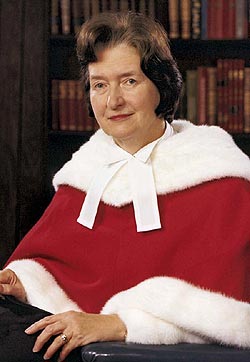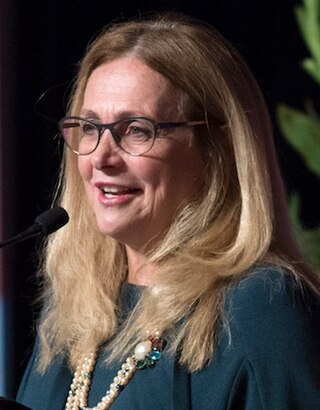
The Supreme Court of Canada is the highest court in the judicial system of Canada. It comprises nine justices, whose decisions are the ultimate application of Canadian law, and grants permission to between 40 and 75 litigants each year to appeal decisions rendered by provincial, territorial and federal appellate courts. The Supreme Court is bijural, hearing cases from two major legal traditions and bilingual, hearing cases in both official languages of Canada.

Beverley Marian McLachlin is a Canadian jurist and author who served as the 17th chief justice of Canada from 2000 to 2017. She is the longest-serving chief justice in Canadian history and the first woman to hold the position.

Bertha Wernham Wilson was a Canadian jurist and the first female puisne justice of the Supreme Court of Canada. Before her ascension to Canada's highest court, she was the first female associate and partner at Osler, Hoskin & Harcourt and the first woman appointed to the Court of Appeal for Ontario. During her time at Osler, she created the first in-firm research department in the Canadian legal industry.
The court system of Canada is made up of many courts differing in levels of legal superiority and separated by jurisdiction. In the courts, the judiciary interpret and apply the law of Canada. Some of the courts are federal in nature, while others are provincial or territorial.

The Supreme Court of British Columbia is the superior trial court for the province of British Columbia, Canada. The Court hears civil and criminal law cases as well as appeals from the Provincial Court of British Columbia. There are 90 judicial positions on the Court in addition to supernumerary judges, making for a grand total of 108 judges. There are also 13 Supreme Court masters, who hear and dispose of a wide variety of applications in chambers.

The British Columbia Court of Appeal (BCCA) is the highest appellate court in the province of British Columbia, Canada. It was established in 1910 following the 1907 Court of Appeal Act.

A bencher or Master of the Bench is a senior member of an Inn of Court in England and Wales or the Inns of Court in Northern Ireland, or the Honorable Society of King's Inns in Ireland. Benchers hold office for life once elected. A bencher can be elected while still a barrister, in recognition of the contribution that the barrister has made to the life of the Inn or to the law. Others become benchers as a matter of course when appointed as a High Court judge. The Inn may elect non-members as honorary benchers – for example, distinguished judges and lawyers from other countries, eminent non-lawyers or members of the British Royal Family, who become known as "Royal Benchers" once elected.
Allan McEachern, BA, LL.B, LL.D was a Canadian lawyer, a judge, and a Chancellor of the University of British Columbia.
Justice Elizabeth BennettKC is judge of the British Columbia Court of Appeal. During her term on the Supreme Court of British Columbia, she presided over two notable corruption trials.

The Law Society of British Columbia is the regulatory body for lawyers in British Columbia, Canada.
P. Colleen Suche, was appointed a judge of the Manitoba Court of King's Bench on July 17, 2002. She replaced Madam Justice Barbara Hamilton, upon her appointment to the Manitoba Court of Appeal. In 2005, Madam Justice Suche also became a deputy judge of the Nunavut Court of Justice.
William ("Bill") S. Berardino, is a British Columbia lawyer who was appointed by the provincial government to serve as a special prosecutor in the trials associated with the BC Legislature Raids.

Lance Sydney George Finch, was a Canadian lawyer and jurist. He was President of the Vancouver Bar Association and a bencher of the Law Society of British Columbia. He was appointed as a judge in 1983 and went on to serve as the Chief Justice of the British Columbia Court of Appeal from 2001 until his retirement on June 16, 2013.
Linda Ann Loo is a Canadian lawyer and judge.
John Lauchlan Farris was a Canadian lawyer and judge. He served one term as President of the Canadian Bar Association, prior to being appointed Chief Justice of British Columbia.
Paul D.K. Fraser was a Canadian lawyer from British Columbia. He served as the Conflict Commissioner for the Legislative Assembly of British Columbia as well as the president of the Canadian Bar Association (1981–1982), the Commonwealth Lawyers Association (1993–1996), and of the Canadian section of the International Commission of Jurists. He also chaired a review of pornography and prostitution laws for the government of Canada.
Kimberly Nixon is a transgender woman who filed a human rights complaint against Vancouver Rape Relief & Women's Shelter Society (VRRS) for discrimination. VRRS argued that Nixon, a transgender woman, did not have the same life experiences as a woman who was assigned female at birth, and could not volunteer as a peer rape counselor. She fought her case successively through the British Columbia Human Rights Tribunal, the Supreme Court of British Columbia, the British Columbia Court of Appeal, each of which rejected her complaint, and then eventually the Supreme Court of Canada, which dismissed her request to appeal the decision against her case on February 1, 2007.

Sheilah L. Martin is a puisne justice of the Supreme Court of Canada, having served in that role since December 18, 2017. She was nominated to the court by Prime Minister Justin Trudeau on November 29, 2017. Before her appointment to Canada's highest court, Martin had served on the Court of Appeal of Alberta, the Court of Appeal for the Northwest Territories, and the Court of Appeal of Nunavut since 2016, and the Court of Queen's Bench of Alberta from 2005 to 2016.
Temple Chambers is a set of barristers' chambers based in Admiralty, Hong Kong. It is widely considered to be one of the leading sets of chambers in Hong Kong given its high ratio of senior counsel to juniors, as well as a strong history of appointments to key judicial and government roles.
Corrine Sparks is a Canadian judge. She was the first Black Canadian woman to become a judge in Canada, and the first black judge in the province of Nova Scotia. Her decision in the case R v S (RD), which was controversially overturned on appeal, was later upheld by the Supreme Court of Canada in a leading decision on reasonable apprehension of bias.









